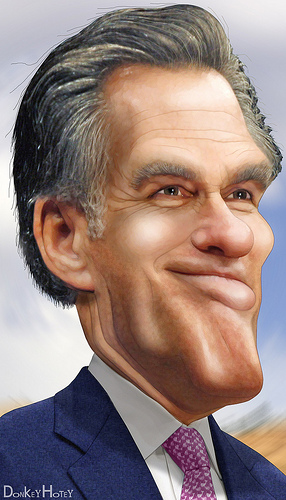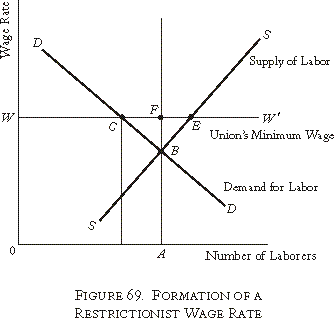 When asked about the minimum wage over the weekend, leading GOP presidential candidate Mitt Romney gave the following response:
When asked about the minimum wage over the weekend, leading GOP presidential candidate Mitt Romney gave the following response:
“My view has been to allow the minimum wage to rise with the CPI [Consumer Price Index] or with another index so that it adjusts automatically over time. I already indicated that when I was governor of Massachusetts, and that’s my view.”
Pegging the minimum wage to the CPI or “some other index” would mean that the minimum wage would be adjusted every year or two to ensure that it remains proportionally equal to rising costs of living. This means the minimum wage would have risen an average of 2.5% per year over the past twenty years (using December-to-December averages from this BLS CPI chart). This would also mean that the minimum wage would decrease if the CPI were to decrease, which is not unprecedented.
But as I’ve discussed on Hans before, raising the minimum wage rarely (if ever) helps those actually making the minimum wage, and will definitely not help raise standards of living or decrease unemployment. The minimum wage is an intervention into the economy that outlaws employment at wages lower than the prescribed/legal minimum. For those workers whose marginal product of labor is less than the new legal minimum, a minimum wage hike is unfortunate indeed, as their work at the new wage would constitute a net loss for their employer, who would have no choice but to fire such a worker. Once again, Murray Rothbard illustrates this best:
“All demand curves are falling, and the demand for hiring labor is no exception. Hence, laws that prohibit employment at any wage that is relevant to the market (a minimum wage of 10 cents an hour would have little or no impact) must result in outlawing employment and hence causing unemployment.
“If the minimum wage is, in short, raised from $3.35 to $4.55 an hour, the consequence is to disemploy, permanently, those who would have been hired at rates in between these two rates. Since the demand curve for any sort of labor (as for any factor of production) is set by the perceived marginal productivity of that labor, this means that the people who will be disemployed and devastated by this prohibition will be precisely the ‘marginal’ (lowest wage) workers, e.g. blacks and teenagers, the very workers whom the advocates of the minimum wage are claiming to foster and protect.”
Thus, Romney’s support of raising the minimum wage is counter-productive if he seeks to increase overall employment…something that has been the center of his campaign thus far. I can’t call his advocacy of the minimum wage a fallacy in and of itself, but it certainly is a misguided idea if he is serious about lowering unemployment. Indeed, he would be far better off simply advocating the continuing of the policy regarding minimum wage that Washington has adopted over the past several decades: raising it by Congressional approval every four or five years. Though this system is flawed itself, it at least allows for a gradual re-employment of those workers whose marginal product of labor is lower than the new minimum wage as the economy grows during the four or five years between the two minimum wage hikes (though the next hike will start the cycle all over again).
Now is Mr. Romney ignorant about this basic economic principle? Or is he giving in to political pressure to raise the minimum wage? My guess would be the latter, seeing as two-thirds of the American population supports raising the minimum wage to $10 and then indexing it to inflation to keep pace with rising costs of living. But either way, this policy will only hinder the lowering of the unemployment rate that would come about if President Romney indeed makes the free market reforms he is promising.


See our “Common Economic Fallacies” page for more information about how minimum wage laws affect unemployment…especially among low-wage, unskilled workers.
Which book is Rothbard’s quote from? Is it Man, Economy and State?
We live in a country (and world) where coaotrrpions like Starbucks spread like wildfire SO much so, that they, self-admittedly, had to close 200 (?) stores in Summer 2008 because they had built too many’ and created too much competition for themselves’ In this mad quest for ever increasing profit margins and wealth we end up with coaotrrpions who not only put others out of business, but even threaten their own operations!? That is what we’re dealing with.If we’re to bring back middle class bring back ability to ACTUALLY choose what we do with our lives the freedom and flexibility to do a hard day’s work, and go to sleep, knowing you worked hard that day, and that you didn’t work just for the profit/gain of some CEO and his stockholding buddies. We need to (economically, legally, socially however) bring about a change in the corporate culture. As far as I’m concerned, we need to find ways of limiting the size/operations of coaotrrpions, not with the intent of restricting international trade but of providing the opportunity for individuals to strike out on their own and create local/small businesses which invest in their local communities.Obviously I’m not sure how to approach this. AND obviously, I recognize many points which would weaken my claim such as, we wouldn’t have affordable computers/technology/cell phones if it weren’t for the GIANT companies like Apple/IBM. Maybe that’s the answer things that CAN be produced/provided locally SHOULD BE and computers, cars, cell phones let the giants do that.
It is from his book “Making Economic Sense”. Link below (and now also in the article):
http://mises.org/econsense/ch36.asp
Many thanks.
Profit running a business comes from repeat customers, customers that boast about any project or service, and that bring friends with them.
Every few seconds it changes – up an eighth, down an eighth -it’s like playing a video slot. I lose $20 million, I gain $20 million.